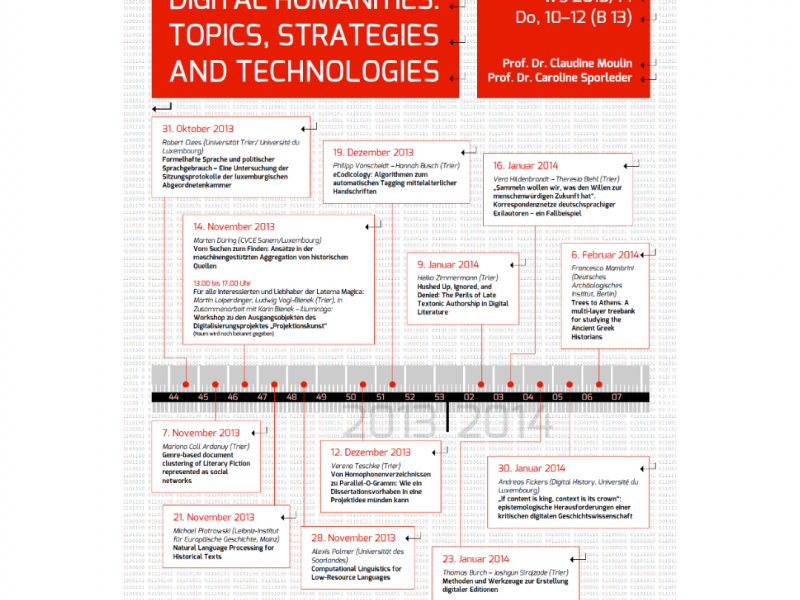Digital Humanities: Topics, Strategies and Technologies

Date:
31.10.2013 bis 06.02.2014Place:
Categories:
EventIn the winter term 2013/14, the scientific colloquium, organised by Prof Dr Claudine Moulin and Prof Dr Caroline Sporleder, offers an overview of current research questions in the Digital Humanities.
Dates:
31 October 2013: Robert Clees (Trier University/ Université du Luxembourg):
Formelhafte Sprache und politischer Sprachgebrauch – Eine Untersuchung der Sitzungsprotokolle der luxemburgischen Abgeordnetenkammer
(Formulaic Language and Political Language Use – An Investigation of Minutes of Meeting of the Luxembourg House of Representatives)
7 November 2013: Mariona Coll Ardanuy (Trier): Genre-based document clustering of Literary Fiction represented as social networks
14 November 2013: Marten Düring (CVCE Sanem/ Luxembourg): Vom Suchen zum Finden: Ansätze der maschinengestützten Aggregation von historischen Quellen
(Searching to Finding: Approaches in the Computer-aided Aggregation of Historical Sources)
For all interested guests and aficionados of the Laterna Magica:
Martin Loiperdinger, Ludwig Vogl-Bienek (Trier), in cooperation with Karin Bienek (illuminago): Workshop with the original objects of the digitisation project “Art of Projection”
(1-5pm, guest room at the ‘Mensa’)
21 November 2013: Michael Piotrowski (Leibniz Institute for European History, Mainz): Natural Language Processing for Historical Texts
28 November 2013: Alexis Palmer (Saarland University): Computational Linguistics for Low-Resource Languages
12 December 2013: Verena Teschke (Trier): Von Homophonenverzeichnissen zum Parallel-O-Gramm: Wie ein Dissertationsvorhaben in eine Projektidee münden kann
(From a List of Homophones to a Parallel-O-Gramme: How a Dissertation Project can become Project Idea)
19 December 2013: Philipp Vanscheidt – Hannah Busch (Trier): eCodicology: Algorithmen zum automatischen Tagging mittelalterlicher Handschriften
(eCodicology: Algorithms for the Automated Tagging of Medieval Manuscripts)
9 January 2014: Heiko Zimmermann (Trier): Hushed Up, Ignored, and Denied: The Perils of Late Textonic Authorship in Digital Literature
16 January 2014: Vera Hildenbrandt – Theresia Biehl (Trier): “Sammeln wollen wir, was den Willen zur menschenwürdigen Zukunft hat”. Korrespondenznetze deutschsprachiger Exilautoren – ein Fallbeispiel
(“We shall collect what embodies the will of a humane future“. Epistolary Networks of German Exile Writers – A Case Study)
23 January 2014: Thomas Burch – Joshgun Sirajzade (Trier): Methoden und Werkzeuge zur Erstellung digitaler Editionen
(Methods and Tools to Create Digital Editions)
30 January 2014: Andreas Fickers (Digital History, Université du Luxembourg): “If content is king, context is its crown”: epistemologische Herausforderungen einer kritischen digitalen Geisteswissenschaft
(“If content is king, context is its crown“: Epistemological Challenges of Critical Digital Humanities)
6 February 2014: Francesco Mambrini (German Archaelogical Institute, Berlin): Trees to Athens. A multi-layered Treebank for studying the Ancient Greek Historians
All guests are very welcome!

